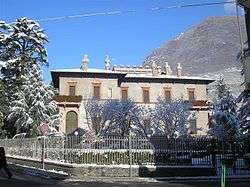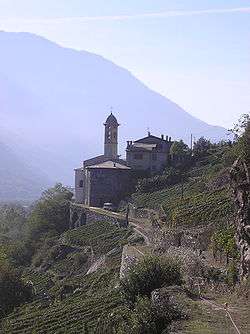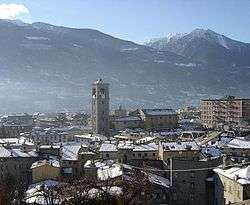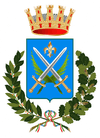Sondrio
| Sondrio | ||
|---|---|---|
| Comune | ||
| Città di Sondrio | ||
|
Panoramic view Sondrio | ||
| ||
.svg.png) Sondrio within the Province of Sondrio | ||
 Sondrio Location of Sondrio in Italy | ||
| Coordinates: IT 46°10′N 09°52′E / 46.167°N 9.867°E | ||
| Country | Italy | |
| Region | Lombardy | |
| Province | Sondrio (SO) | |
| Frazioni | Arquino, Colda, Gualtieri, Ligari, Moroni, Mossini, Ponchiera, Sant'Anna, Sassella, Triangia, Triasso | |
| Government | ||
| • Mayor | Alcide Molteni[1] (PD) | |
| Area | ||
| • Total | 20.88 km2 (8.06 sq mi) | |
| Elevation | 360 m (1,180 ft) | |
| Population (31 December 2013)[2] | ||
| • Total | 22,095 | |
| • Density | 1,100/km2 (2,700/sq mi) | |
| Demonym(s) | Sondriesi | |
| Time zone | CET (UTC+1) | |
| • Summer (DST) | CEST (UTC+2) | |
| Postal code | 23100 | |
| Dialing code | 0342 | |
| Patron saint | Sts. Gervasius and Protasius | |
| Saint day | June 19 | |
| Website | Official website | |


Sondrio [ˈsondrjo] ![]() listen (archaic German: Sünders or Sonders, Latin: Sundrium, Italian: Sondrio, Lombard: Sùndri, Romansh: Sunder) is an Italian town and comune located in the heart of the Valtellina. As of 2012, Sondrio counts approximately 21,876 inhabitants (2015) and it is the administrative centre for the province of Sondrio. In 2007, Sondrio was given the Alpine Town of the Year award.
listen (archaic German: Sünders or Sonders, Latin: Sundrium, Italian: Sondrio, Lombard: Sùndri, Romansh: Sunder) is an Italian town and comune located in the heart of the Valtellina. As of 2012, Sondrio counts approximately 21,876 inhabitants (2015) and it is the administrative centre for the province of Sondrio. In 2007, Sondrio was given the Alpine Town of the Year award.
History
Formerly an Ancient Roman military camp, today's Sondrio was founded by the Lombards: in their language Sundrium meant "Exclusive property", referring to the status of free men (arimanni) of the holders of the city and the surrounding land.
After the fall of the Lombard Kingdom in Italy, Sondrio became part of the Holy Roman Empire. The Capitanei of Vizzola, who controlled much of the Valtellina, had it in 1040 from the emperor Henry II. From 1310 to 1335 the city was involved in the war between the Guelph and Ghibelline factions of the nearby Como, and its war against Milan. After having resisted several attacks by the Comaschi, in 1335 Sondrio and Valtellina became part of the Visconti Milanese dominions.
From the second half of the 16th Century to the end of 18th Century, Sondrio was governed by the Tre Leghe Grigie ("Three Grey Leagues") of the Grisons, as the capital city of Valtellina. After the Reformation, Sondrio was the centre of heavy struggles between the Catholic Valtellinesi and the Protestant Grisons. In 1620 the citizens, led by Giacomo Robustelli, killed 180 Protestants and declared the independence of the Valtellina.
After the Napoleonic parenthesis, in which it became part of the Cisalpine Republic (later Kingdom of Italy), Sondrio with the Valtellina was annexed to the Austrian Kingdom of Lombardy-Venetia, and fought gallantly for its independence.
Geography
The town is located in the middle of the province, and borders with the municipalities of Albosaggia, Caiolo, Castione Andevenno, Faedo Valtellino, Montagna in Valtellina, Spriana and Torre di Santa Maria. Its hamlets (frazioni) are Arquino, Colda, Gualtieri, Ligari, Moroni, Mossini, Ponchiera, Sant'Anna, Sassella, Triangia and Triasso.
Economy
The territory of Sondrio is has numerous vineyards; wines produced include the Sassella and Grumello. Wine represents one of the main resources of this region, together with tourism, especially in winter.
Another important piece of Sondrio's economy is its banking industry, with the Banca Popolare di Sondrio[3] and the Credito Valtellinese[4] both headquartered in Sondrio and listed on the Milan Stock Exchange.
Main sights
The heart of Sondrio is its central Garibaldi Square. Not far from it is the Palazzo Sassi, that is home of the Art and History Museum of Valtellina. In a dominant position, near the ancient road to the Valmalenco, linking the town to Switzerland, stands the Masegra Castle, housing the Historical Museum of the Grisons Domination.
The church of Santi Gervasio e Protasio, rebuilt in neo-classicist style in 1838, was once a medieval pieve and has been a collegiate church since as early as the 12th century. Other sights include the Torre Ligariana, once the collegiate's bell tower, and the Palazzo Pretorio, once the seat of the Grisons government.
People
- Giovanni Pietro Ligario (1686–1748), painter
- Antonio Caimi (1814–1878), painter
- Enrico Sertoli (1842–1910), physiologist and histologist
- Antonio Carini (1872–1950), physician, bacteriologist and professor
- Pier Luigi Nervi (1891–1979), engineer
- Valerio Ricetti (1898—1952), Italian-Australian hermit
- Gianni Celati (b. 1937), writer, translator and literary critic
- Sophia Zopatti Lewis (b.1941), Olympic Dressage Hunter/Jumper Rome 1960
- Giulio Tremonti (b. 1947), politician
- Benedetto Della Vedova (b. 1962), politician
- Raffaella "Raffy" Rossi (b. 1974), ski mountaineer and skyrunner
- Luca Colombo (b. 1984), football player
- Matteo D'Alessandro (b. 1989), football player
- Robert Antonioli (b. 1990), ski mountaineer
- Michele Boscacci (b. 1990), ski mountaineer
- Arianna Fontana (b. 1990), short track speed skatereis
International relations
Twin towns / Sister cities
Sports
Sondrio Calcio is the football club of the city and currently plays in Serie D.
See also
References
External links
![]() Media related to Sondrio at Wikimedia Commons
Media related to Sondrio at Wikimedia Commons
|

